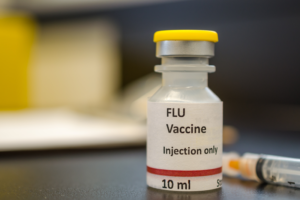Why it is important for everyone to get their flu shot? And there is still time to get it.
 The 2020-2021 flu season is expected to be particularly strenuous on health care facilities as it is compounded with the current COVID-19 pandemic. This year it is very important to get the flu shot to prevent the spread of the virus and to minimize the additional strain on local health care systems. The typical flu season starts in the fall and lasts until early spring. The ideal time to get the vaccine is September or October to ensure protection throughout the season; however, the vaccine can be administered at any time during flu season. The flu vaccine helps to build herd immunity and aids in preventing the flu virus from spreading – protecting yourself and the people around you.
The 2020-2021 flu season is expected to be particularly strenuous on health care facilities as it is compounded with the current COVID-19 pandemic. This year it is very important to get the flu shot to prevent the spread of the virus and to minimize the additional strain on local health care systems. The typical flu season starts in the fall and lasts until early spring. The ideal time to get the vaccine is September or October to ensure protection throughout the season; however, the vaccine can be administered at any time during flu season. The flu vaccine helps to build herd immunity and aids in preventing the flu virus from spreading – protecting yourself and the people around you.
The Centers for Disease Control and Prevention (CDC), estimates that the flu affects between 3% and 11% of the U.S. population each year. Symptoms of the flu include coughing, fever, headache, muscle and body aches, and a sore throat, among other symptoms. Because the symptoms of COVID-19 and the seasonal influenza are so similar, it is more important than ever to get the flu vaccine to better identify COVID-19 cases.
Why do I need to get the flu shot every year?
The composition of the flu shot changes annually according to the flu strains the CDC determines are most likely to appear that year. Influenza A and Influenza B are the most common causes of the seasonal flu and each year they mutate, resulting in the need for a new vaccine. For the 2020-2021 influenza season the flu vaccine (quadrivalent formulation) has two strains of influenza A (i.e., H1N1 and H3N2) and two strains for influenza B (i.e., Washington and Victoria lineage).
How effective is the flu vaccine?
The annual flu vaccine is typically between 50% and 60% effective. The efficacy of the vaccine changes from year to year depending on how well the vaccine protects against the strain that is affecting communities. The flu shot can also reduce the severity of the flu and decrease hospitalization for those who contract the disease.
Who should get a flu shot?
Everyone over the age of six (6) months is eligible to receive the flu vaccine. Groups at high-risk for contracting the flu and developing severe complications from the flu include:
- pregnant women;
- children between six (6) month and five (5) years old;
- individuals over the age of 65;
- anyone with chronic or underlying health issues; and
- residents of nursing homes.
Individuals working in a public setting, such as teachers, medical professionals, emergency response personnel, and individuals working in retail are also considered high-risk for contracting the flu and should get vaccinated.
Some individuals are unable to get the flu vaccine for medical reasons, which is why it is so important for everyone who can get the vaccine to do so. When a large number of individuals receive a vaccine they are protecting those who cannot by providing herd immunity. People should not get the flu shot if they previously had a bad reaction to the vaccine, if they have an allergy to eggs or mercury, or if they have Guillain-Barré syndrome (GBS).
What are the side effects to the flu vaccine?
A common misconception of the flu vaccine is that it can give you the flu or another respiratory disease. The vaccine does not give you the flu or increase your risk of contracting COVID-19. After receiving the vaccine, it takes about two weeks for it to take effect, during that time individuals are susceptible to contracting the flu if they are exposed.
Most people experience no side effects and any side effects usually last about a day. The side effects from the vaccine are generally mild and can include headaches, stuffy nose, or sore throat. If you experience more severe side effects, you should contact your health care provider immediately.
What vaccines are available?
The standard flu shot is typically administered as an injection in the muscles of the arm, but other forms are available including high-dose, intradermal, and nasal spray.
A high-dose vaccine has been approved by the Food and Drug Administration (FDA) for people age 65 and over. Older Americans are eligible for this vaccine because the regular flu vaccine is often not as effective in older individuals due to the natural weakening of the immune system.
For individuals who are uncomfortable with needles and injections, the Fluzone Intradermal is available for individuals between the ages of 18 and 64. An intradermal vaccine uses smaller needles that inject just under the skin. The Fluzone Intradermal needle is 90% smaller than the needle used for the typical flu shot and is just as effective.
The nasal spray option, LAIV FluMist, is approved for health individuals between the ages of 2 and 49 and it is not approved for pregnant women. Due to its limited use, the CDC does not have data on the effectiveness of the nasal spray; however, data from other countries demonstrates the effectiveness to be similar to the standard injection.
Where can I get a vaccine?
Contact your local health department to find low cost or free vaccination centers in your area. Many local pharmacies and grocery stores also administer the flu shot at low or no cost. Flu shots are also in stock at doctors’ offices. Use the CDC’s vaccine finder to find where the vaccine is being administered in your community.




